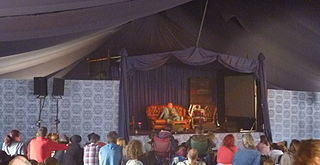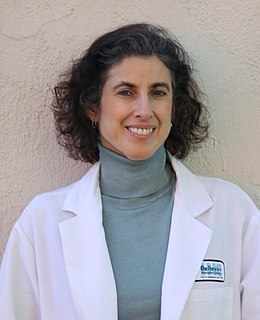A Quote by Steven C. Hayes
Could we take anxiety to be something that may be of importance, may even be meaningful? And it says something about your history, and could we learn to sort of hold it in a way that's more compassionate, to sort of bring the frightened part of you close and treat it with some dignity, and keep focused instead on what kind of life you want to live connected to what kind of meaning and purpose. That's going to be a quicker, more self-compassionate and more certain journey forward inside things like panic disorder.
Quote Topics
About
Anxiety
Bring
Certain
Close
Compassionate
Connected
Could
Dignity
Disorder
Even
Focused
Forward
Frightened
Going
History
Hold
Importance
Inside
Instead
Journey
Keep
Kind
Learn
Life
Like
Live
May
Meaning
Meaningful
More
Panic
Part
Purpose
Quicker
Says
Self
Some
Something
Sort
Take
Things
Treat
Want
Way
Your
Related Quotes
Holding anxiety as your own enemy, and that it has to go down, diminish it, go away and not happen here is a kind of self-invalidating, interiorly focused process that would get you even more entangled with these processes. Instead, what we're going to need to learn to do is to allow your history to bring into the present thoughts and feelings and memories, and to sort of hold them mindfully and self-compassionately, and then focus on what you do and bring them along for that journey.
Be clear in your mind what you want the outcome of your communication to achieve. If your aim is more than just to vent your anger towards a meat eater and you sincerely want that person to be a kinder more compassionate being, then you must start by seeing them as a kind and compassionate person. If you are unable to see them as kind and compassionate, then how dare you demand them to see themselves that way.
But this cheap-thrill version, this sort of ease definition, the feel-good definition of happiness is an empty promise. Unless we get wiser as to how to carry the difficulties of life in a way that's self-compassionate and empowering, we can create this kind of world in which we'd rather sort of plug into the matrix with whatever pills or escapist tendencies we can think of instead of walking through a process of living that's going to include loss. It's going to include limitations on function. We need to learn and teach our children how to do that.
Not that my life has been so crazy and exciting but, it just seems like if I can bring more of myself to the role. It's going to help keep it spontaneous and exciting, instead of thinking in terms of this box of a human that I have to slip myself into every week, which I tend to do more when I'm shooting a movie. On a television show, this is all kind of still new to me, doing many episodes of something, so I want to try to keep it as fresh and close to home as possible, so it doesn't get stale and I still like it every day.
I always try to bring a little bit of my own personality to the character, or some sort of personal connection makes it a little bit more of an organic portrayal and the audience can kind of maybe believe it a little bit more. But I always look for something to kind of connect with and identify with, or bring something of myself to the table.
Nothing in this world is more powerful, or more dangerous, than the truth. That's why some people go to such lengths to avoid hearing it. It may also be why others strive so hard to keep their conversations empty. They wouldn't want to find themselves accidentally saying something meaningful that might bring about a change.
Being a doctor, I worry that the patient may be uncomfortable about sharing something. It could be sexual dysfunction, an eating disorder, depression, domestic violence - these are serious topics many people don't want to talk about. I'll try to follow up with questions like: How are things at home? How's work? But we don't always have time to probe. Don't be afraid to bring up the important things going on in your life, even if they don't feel 'medical.' Your doctor would rather know than not know.
What I mean is that if you really want to understand something, the best way is to try and explain it to someone else. That forces you to sort it out in your mind. And the more slow and dim-witted your pupil, the more you have to break things down into more and more simple ideas. And that's really the essence of programming. By the time you've sorted out a complicated idea into little steps that even a stupid machine can deal with, you've learned something about it yourself... The teacher usually learns more than the pupils. Isn't that true?
I believe that earning your living doing something you enjoy is one of the very best ways to nourish yourself. But even if you are employed at something that is not your ideal work, it is important to find ways to take as much pleasure in it as possible. Living in the present moment can make ordinary activities more interesting and joyful; you may be surprised, if you only look, at what you will find. If you try to stay connected with why you are doing what you are doing, for example, then even the parts of your life that aren't especially interesting can become more meaningful.
I read a lot, I always read. I like to be inside a story. When I started acting, even in high school, it sort of felt like that's as close as you can get to being inside a book, and I feel that way even with movies more so, because you've kind of created this imaginary world, and everybody is colluding to create it.
One dangerous definition of happiness is to think of happiness as kind of a warm, joyful feeling in your heart that you have to pursue and grab and hold onto for fear that it'll go away. A better way to think about happiness that actually is something that I think you can reach towards is, it's living in accord with your values and in a way that is more open and accepting of your history as it echoes into the present, that's more self-affirming, self-validating and values-based. The Greeks had a word for it; they called it eudaimonia. And it is something that will empower human lives.
By government giveaway programs, individuals are often hurt far more than they are helped. The recipients of these programs become dependent on the government and their dignity is destroyed. Is it compassionate to enslave more and more people by making them a part of the government dependency cycle? I think compassion should be measured by how many people no longer need it. Helping people to become self-sufficient is much more compassionate than drugging them with the narcotic of welfare.
Love is wise; hatred is foolish. In this world, which is getting more and more closely interconnected, we have to learn to tolerate each other, we have to learn to put up with the fact that some people say things that we don't like. We can only live together in that way. But if we are to live together, and not die together, we must learn a kind of charity and a kind of tolerance, which is absolutely vital to the continuation of human life on this planet.





























